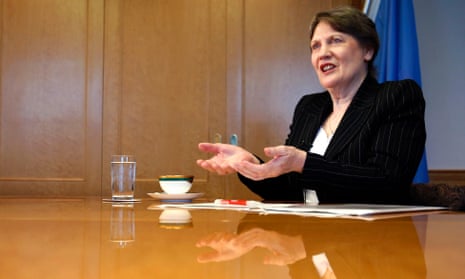The decision to redefine overseas aid to include some military spending in fragile countries will hinder international efforts to help the poorest nations and could even undermine their stability, the UN’s development chief has warned.
Last week, the Organisation for Economic Co-Operation and Development (OECD) revised the rules on what can be counted as foreign aid – technically known as official development assistance (ODA) – following lobbying from the UK and other member countries.
Although proponents of the new definition argue that supporting military or security forces in fragile or war-ravaged states should be seen as a development aim and paid for from the aid budget, the move has been criticised by charities who fear it will mean less money reaches the poorest countries.
Helen Clark, the former New Zealand prime minister who now heads the UN Development Programme (UNDP), said such concerns were entirely justified, adding that those working to alleviate poverty were already struggling because of static levels of ODA and the increasing financial demands of humanitarian emergencies such as the Syrian crisis.
“If it was accompanied by growing ODA, it might not be noticed so much,” she said.
“But we really are at a bit of a plateau on ODA and the amount that is available for plain, ordinary development is less, because of all these other pressures on peacekeeping budgets, on the amount that can be counted for refugee resettlement in the OECD countries – and just the sheer need to meet people’s needs for humanitarian catastrophes. It is problematic.”
Although ODA reached a record high of $135.1bn in 2013, it is levelling off and aid to the least developed countries is still falling.
Clark said any increase in aid spent on peacekeeping and security would make times “very lean” for low-income countries, warning that significant reductions in support could push them over the edge.
“Today’s poor but stable – even today’s middle-income but stable – [countries] can be tomorrow’s highly unstable and fragile countries,” she said.
“We have to take the long-term perspective of working alongside countries on peaceful and inclusive development.”
Speaking to the Guardian before Wednesday’s ministerial meeting to mark the UNDP’s 50th anniversary, Clark said financial focus on the areas of greatest humanitarian need was already adversely affecting some of the programme’s work.
“Money is very much flowing to the most fragile contexts – a share of that also comes to the UNDP because we are very active in the middle of crises; as in the Syrian one or others,” she said.
“But it is frustrating our ability … to continue the level of support we’ve traditionally given to other countries who aren’t in conflict or disaster. That’s an issue for us.”
But despite the OECD’s decision and the competing demands of major crises – from Syria and Iraq to Yemen and South Sudan – Clark said she had already noticed the beginnings of a “sea change” in the way the donor community was looking at the relationship between development and humanitarian response.
“The truth is that the humanitarian system cannot cope with the burden it now has and that is ensuring that the main donors are looking at more sustainable approaches,” she said.
Clark said there was a growing trend towards essential, sustainable approaches such as planning for, and trying to mitigate, the effects of natural disasters, building more peaceful and inclusive societies and doing more to ensure that displaced people get the help they need to help themselves.
“That sort of theme of shrinking the need, being on the front foot with prevention and ensuring that development isn’t something that stays in the background while immediate needs are met – because that does not work in a protracted crisis at all – and also working on whatever can be done on the prevention side with conflict and on building social cohesion and political dialogue; these issues are now very much at the forefront of the international debate,” she added.
“It is bringing the development side very much into the prevention of and response to crises.”
Clark also said social and economic development had a key role to play in tackling the refugee crisis.
She pointed to Afghanistan, where increasing levels of violence are pushing many Afghans to head for Europe – by September 2015, they made up 13% of refugees crossing the Mediterranean.
“These are issues of development at home,” said Clark. “The economy is very, very slow there at the moment because it had the artificial boost from a big troop presence: many, many foreign troops create a whole infrastructure which is a bubble effect. But the bubble effect is gone.
“If we look at the Afghanistan context with the major Brussels conference coming up this year on development support, I would be surprised if it doesn’t also start to go down this track of, ‘How do we build the resilience of people to cope? How do we lock in and try to safeguard gains? How do we support people through a very difficult patch?’”
Perhaps most heartening, said Clark, was the “incredible breakthrough” in the recent international response to the Syria crisis. She said the discourse had evolved markedly between the third donor conference in Kuwait in March 2015 and the donor meeting held in London this month.
“The speeches made by the leaders in London were about building the resilience of people; it was very much around, ‘How do we support people having livelihoods, jobs, opportunities, schooling for the children, access to basic services?’ – even in the middle of profound crises,” she said.
“I think it’s actually come quite a long way and the challenge now will be to apply this more broadly.”
